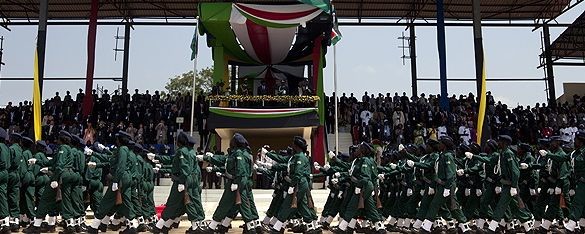The Juba Telegraph, a newspaper directly tied to South Sudan’s Office of the President, is expected to launch tomorrow at an event in the capital Juba.
Presidential Press Secretary Ateny Wek is proprietor of the paper, which is launched under the theme, “Promoting Integrity and National Sovereignty.”
The paper is established under a private entity called The Telegraph Media Company. The designated editor-in-chief is Emmanuel Monychol Akop, a recent university graduate in Media Management studies with ties to the government.
Monychol describes himself as a recent employee of the Warrap State government, responsible for drafting reports and speeches for the governor, according to his own professional profile on the networking website LinkedIn.
A programme for the launch event distributed to various media houses discloses that the chairman of the Board of Directors of The Juba Telegraph is Bona Bang Dhel, a member of the state parliament of Warrap, the president’s home state.
The Juba Telegraph will compete for market share against a handful of other English-language newspapers distributed in South Sudan’s capital, including The Citizen for which Ateny Wek used to write as a columnist, and Juba Monitor.
The launch of the paper comes shortly after the government laid out its vision to make the South Sudanese media more “nationalistic.”
In a speech last Sunday, the Spokesperson of the Government of South Sudan Michael Makuei said, “The fact that you are a journalist doesn’t mean that you are de-nationalized. It means that first you are a nationalist.”
“In the first place you are South Sudanese,” he said, urging journalists to “protect the interests of your nation.”
Makuei declared, “You must be seen to be nationalists,” adding that people who fail to support the government and instead “agitate the people” against it will be punished.
“If we continue to use these freedoms in this way, then this is the time when you find yourself automatically in conflict with the law,” the government spokesperson stated.
The government on Thursday reiterated threats against the Catholic station Radio Bakhita not to cover political issues considered objectionable. The station was raided in August and shut down for nearly a month, making it the latest media house to be targeted by the National Security Service, which reports to the president.
No court was involved in the shutdown order, but rather the National Security Service carried out the action without making any legal filing on the matter. Thereafter Kiir’s office directly held the file on the station for nearly a month before allowing the station to reopen conditionally.
All major independent media houses in the South Sudanese capital Juba have been raided since December 2013. Two international human rights organizations, Amnesty International and Human Rights Watch, stated in a report on 1 August that the media clampdown is related to a ‘cover-up’ of mass killings.
Journalists in South Sudan have been regularly prevented from visiting hospitals, morgues, mass graves sites, and IDP camps.
File photo: A military parade before Gen. Salva Kiir in Juba
Related coverage:
Timeline: media struggle in South Sudan (18 Aug.)
National Security confiscates Juba Monitor newspaper (3 July)
S. Sudan main daily newspaper to shut down (10 June)




